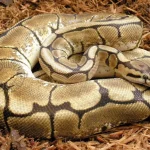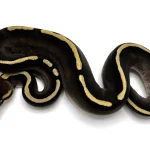Have you ever marvelled at the enchanting patterns of the Spider Ball Python?
With its mesmerizing spider-like markings and vibrant colours, this morph captivates both seasoned herpetologists and curious newcomers alike.
What makes the Spider Ball Python a favourite among reptile enthusiasts?
Dive into the world of this unique morph and discover the fascinating traits that set it apart from its counterparts!
Spider Ball Python History & Genetics
The Spider Ball Python has an intriguing history that began in the early 1990s when it was first discovered in the wild.
This captivating morph is known for its distinctive spider-like pattern, featuring an array of irregular blotches and a striking contrast of colours.
Genetically, the Spider Ball Python results from a single-gene mutation that alters the normal pattern of a ball python, creating its unique appearance.
This morph quickly gained popularity among reptile enthusiasts for its visual appeal and charm.
As breeders began to explore the genetic possibilities, the Spider Ball Python became a key player in developing exciting combinations, making it a sought-after addition to any collection.
The ongoing fascination with this morph inspires breeders and keepers alike, ensuring its place in the world of ball pythons.
Spider Ball Python Traits
Appearance
- Body Color: The Spider Ball Python typically features a beautiful pattern with a yellow or golden base colour and bold, dark brown or black markings.
- The unique spider-like pattern creates a striking contrast, making this morph visually appealing.
- Shape: These snakes have a robust and cylindrical body shape, which is typical of ball pythons.
- Their body is muscular, allowing them to constrict their prey effectively.
- Eyes: The eyes of the Spider Ball Python are generally dark and round, contributing to their striking appearance.
- Belly: The belly is usually a lighter colour, often white or cream, contrasting the darker patterns on the back.
- Head Shape: The head is wide and triangular, characteristic of ball pythons.
- The Spider morph may have some unique markings on the head, which can enhance its appearance.
- Tail: Like other ball pythons, the tail is typically short and tapered, allowing for easy movement in their environment.

Spider Ball Python Size and Weight
Behaviour and Temperament
- Behaviour: They are generally calm and docile, making them suitable pets for beginners.
- They are known for their friendly demeanour and usually do not bite unless provoked.
- Temperament: These snakes are curious and can be shy, preferring to hide in their habitat.
- Regular handling from a young age can help them become more comfortable with human interaction.
Spider Ball Python Lifespan
In captivity, they can live for 20 to 30 years with proper care. Providing a suitable environment, diet, and healthcare can help maximize their lifespan.
Spider Ball Python Cost
Best Place to Buy
It’s crucial to buy from trustworthy sources to ensure the health and quality of the snake.
The best places to buy Spider Ball Pythons include reputable breeders, local pet shops, and online marketplaces like MorphMarket or Reptiles by Mack.
Spider Ball Python Breeding & Reproduction
Breeding Spider Ball Pythons is an exciting journey that showcases the beauty of these unique morphs while allowing you to contribute to their genetic diversity.
Here’s an engaging look at the process:
Understanding the Breeding Cycle: The breeding season for Spider Ball Pythons typically spans from late fall to early spring.
During this time, females will undergo a cooling period, signalling their readiness to mate. This seasonal cue is essential for stimulating ovulation and ensuring successful breeding.
Choosing the Right Pair: Selecting a healthy and mature male is crucial for successful reproduction.
Ideally, females should weigh at least 1,500 grams and exhibit good overall health before introducing them to a male.
The Courtship Dance: Male Spider Ball Pythons engage in an intriguing courtship ritual, often initiating the process by “waggling” their tails.
This charming behaviour can last several hours as the male attempts to lock in with the female. Once they lock, multiple mating sessions may occur over several days.
Egg Production: After successful mating, the female will develop and lay eggs approximately 30 days later.
Incubation Magic: Once the eggs are laid, they need to be placed in an incubator set to 88-90°F (31-32°C) with a humidity level of 60-80%.
The waiting game begins, lasting about 55 to 60 days.
This period is critical for the embryos, and any fluctuations in temperature or humidity can impact their development.
Hatching Wonders: The moment of hatching is filled with excitement.
The hatchlings will typically begin to emerge from their eggs, usually requiring a little help to break free from the shell.
Observing the first moments of life is a rewarding experience for any breeder.
12 Famous Spider Ball Python Morph Combinations
1. Banana Spider Ball Python Morph
- Genetics: Banana + Spider
The Banana gene brings bright yellows and oranges, while the Spider gene adds a web-like pattern across the body, resulting in a striking contrast of vibrant colours with streaky markings.

2. Pastel Spider Ball Python Morph
- Genetics: Pastel + Spider
The Pastel gene lightens the overall colour, enhancing the yellow tones, while the Spider gene creates thin, dark web-like markings. This morph has a bright, glowing look with clean, defined patterns.
3. Butter Spider Ball Python Morph
- Genetics: Butter + Spider
The Butter gene softens the dark pigments, creating a buttery yellow body, while the Spider gene overlays streaks of dark brown or black webbing, offering a soft but striking contrast.
4. Albino Spider Ball Python Morph
- Genetics: Albino + Spider
The Albino gene removes all dark pigments, resulting in a white and yellow snake with red eyes. Combined with the Spider gene, this morph features yellow spider web markings over a bright white base.

5. Enchi Spider Ball Python Morph
- Genetics: Enchi + Spider
The Enchi gene deepens the orange and gold tones while reducing the amount of black pigment. The Spider gene adds web-like markings, creating a more vibrant, golden-yellow snake with subtle patterning.
6. Fire Spider Ball Python Morph
- Genetics: Fire + Spider
The Fire gene lightens the overall appearance, making the yellows brighter and cleaner. When paired with the Spider gene, the morph has soft brown spider webbing that gets more vibrant as the snake matures.
7. Mojave Spider Ball Python Morph
- Genetics: Mojave + Spider
The Mojave gene brings muted colours like greys and soft yellows, while the Spider gene adds its signature streaks, creating a subtle contrast between the two. The result is a morph with distinct patterns and delicate colouring.
8. Calico Spider Ball Python Morph
- Genetics: Calico + Spider
The Calico gene causes random white patches to appear on the snake, while the Spider gene produces dark streaks. This morph showcases an interesting combination of stark white spots and dark web-like patterns.
9. Leopard Spider Ball Python Morph
- Genetics: Leopard + Spider
The Leopard gene intensifies the pattern, making the Spider’s webbing bolder and darker. This combination creates a visually striking morph with sharp, highly contrasting patterns.
10. Spider Clown Ball Python Morph
- Genetics: Clown + Spider
The Clown gene reduces the amount of pattern on the snake, and when combined with the Spider gene, it creates a more minimalistic but bright yellow look, with a softened spider-like pattern.
11. Spider Pied Ball Python Morph
- Genetics: Pied + Spider
The Pied gene introduces large patches of white, while the Spider gene creates patterned streaks in the remaining pigmented areas. The result is a unique snake with random white patches and web-like designs on the coloured sections.
12. Spider Pinstripe Ball Python Morph
- Genetics: Pinstripe + Spider
The Pinstripe gene creates thin, straight lines, while the Spider gene adds a webbing effect. Together, they form a linear yet chaotic pattern with golden hues and dark streaks, offering a morph with lots of intricate details.
Spider Ball Python Care Sheet
1. Habitat Setup
- Enclosure Size: For hatchling Spider Ball Pythons, a 20-gallon tank is perfect.
- As they grow into adults, upgrade to a spacious 40-gallon or larger enclosure to provide ample room for exploration and movement.
- Substrate: Create a comfortable habitat using safe substrates like aspen shavings, coconut husk, or paper towels.
- These materials offer both comfort and ease of cleaning, ensuring a healthy environment for your snake.
- Hiding Spots: Your Spider Ball Python needs secure hiding spots!
- Include at least two—one on the warm side for basking and another on the cool side for relaxation. This helps them feel safe and secure.
2. Temperature and Lighting
3. Diet and Feeding
- Feeding Frequency: Hatchlings should be fed every 5-7 days, while adults can be fed every 10-14 days.
- Establishing a consistent feeding schedule helps ensure proper growth and health.
- Prey Size: Offer prey that is approximately the same diameter as your Snake’s body, typically frozen/thawed mice or rats.
- This ensures safe and effective feeding.
- Water Source: Provide a shallow water bowl filled with clean, fresh water at all times. Hydration is key to your snake’s health!
4. Handling
- Frequency: Handle your Spider Ball Python gently and regularly (1-2 times per week) to build trust and a bond with your pet.
- Proper Techniques: Always support the entire body during handling and avoid sudden movements to create a calm experience for your snake.
5. Health and Wellness
6. Shedding
- Shedding Process: Expect your Spider Ball Python to shed every 4-6 weeks. Signs that shedding is approaching include dull skin and blue-tinted eyes.
- Humidity Increase: Raise humidity to 60-70% during shedding to facilitate a smooth and easy shedding process.
7. Cleaning
Conclusion
The Spider Ball Python is a beautiful and unique morph that captivates snake lovers with its stunning patterns and friendly nature.
With proper care and a suitable environment, this charming snake can thrive as a wonderful pet. Are you ready to add this enchanting snake to your home?







Rattling clean web site, thankyou for this post.